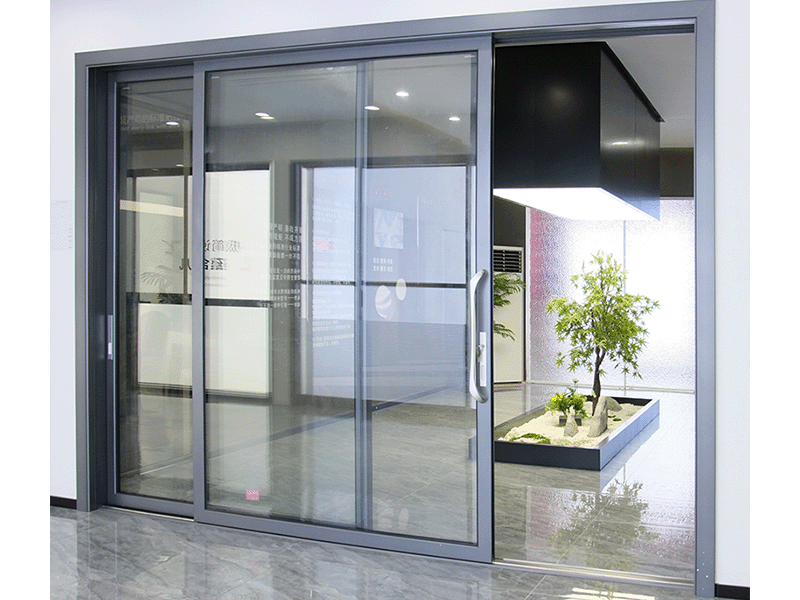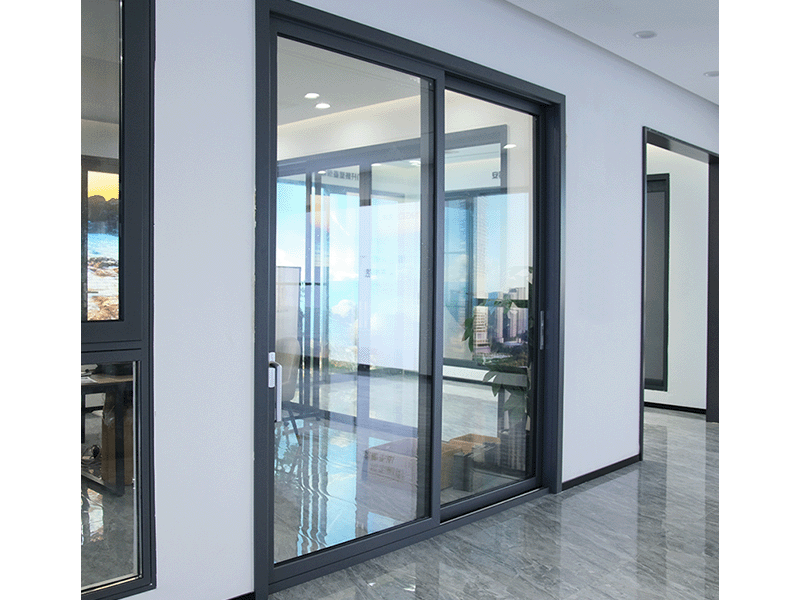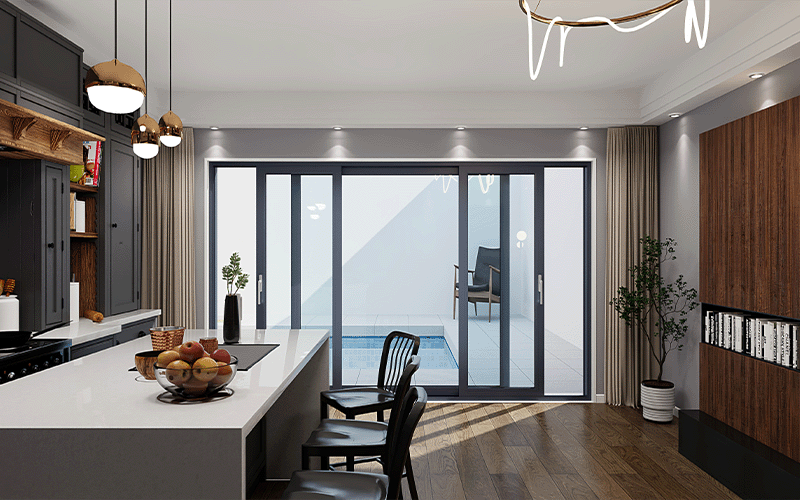When it comes to choosing doors for homes, offices, or industrial buildings, durability is one of the most important factors to consider. Doors serve as a primary barrier to protect interiors from external elements and must endure years of use without losing their functionality or aesthetic appeal. Among the many materials available—wood, steel, fiberglass, and aluminum—aluminum doors have gained popularity for their exceptional durability and overall performance.
The Unique Properties of Aluminum Doors
Aluminum is a lightweight yet highly durable metal, making it an ideal choice for door construction. Unlike some other materials, it combines strength, versatility, and resistance to environmental factors. These properties directly contribute to the long lifespan and reliability of aluminum doors.
Corrosion Resistance: One of aluminum’s standout features is its natural corrosion resistance. This is due to a thin oxide layer that forms on its surface, acting as a protective shield against moisture, salt, and other corrosive substances. It makes aluminum doors particularly suitable for humid or coastal regions, where wooden doors are prone to rotting and steel doors often succumb to rust.
Strength Without Bulk: Although aluminum is lightweight, it offers impressive structural strength. Modern aluminum doors are often reinforced with thermal breaks or additional frames to enhance their performance under heavy loads or high-impact scenarios. In comparison, wooden doors require a thicker and bulkier design to achieve similar strength, which can make them cumbersome.
Durable 6550 Heavy Duty Sliding Door
Comparing Aluminum Doors with Other Materials
To fully understand why aluminum doors are a preferred choice for durability, it’s essential to compare them to the alternatives in detail:
Aluminum vs. Wood
Wooden doors are valued for their natural aesthetic and insulation properties. However, their durability is limited due to vulnerabilities such as:
Moisture Damage: Wooden doors absorb water, which leads to warping, cracking, and rotting over time, especially in humid environments.
Pests: Termites and other insects can damage wooden doors, reducing their structural integrity.
Maintenance: Wooden doors require regular sanding, painting, or varnishing to maintain their appearance and protect them from decay.
In contrast, aluminum doors are immune to these issues. They do not warp, swell, or attract pests. Additionally, aluminum requires minimal upkeep, retaining its functionality and appearance for decades with little effort.
Aluminum vs. Steel
Steel doors are robust and often used in industrial settings where security and impact resistance are crucial. However, steel doors have significant drawbacks:
Corrosion: While galvanized or stainless steel resists rust better, regular steel doors are highly susceptible to corrosion in wet or salty environments.
Weight: Steel is much heavier than aluminum, which can strain door frames and hinges, leading to quicker wear and tear.
Thermal Conductivity: Steel doors can become uncomfortably hot or cold, depending on the temperature, while aluminum doors with thermal breaks offer better energy efficiency.
Aluminum doors, while slightly less impact-resistant than steel, strike a balance between strength, weight, and corrosion resistance, making them more practical for long-term use in diverse settings.
Aluminum vs. Fiberglass
Fiberglass doors are relatively durable and offer good insulation. However, they have limitations:
Brittleness: Over time, fiberglass can become brittle, especially when exposed to UV radiation for extended periods.
Cracking: Fiberglass doors may crack under extreme stress or impact, reducing their lifespan.
Limited Customization: Fiberglass is less versatile in terms of design and size customization compared to aluminum.
Aluminum doors, with their flexibility in customization and long-lasting finish, outperform fiberglass in both aesthetic adaptability and durability.
|
Material |
Advantages |
Disadvantages |
Advantages of Aluminum Doors |
|
Wood |
Natural aesthetic |
Prone to moisture damage (warping, cracking, rotting) |
Resistant to moisture and warping |
|
Steel |
High strength |
Susceptible to rust (unless galvanized or stainless steel) |
Naturally corrosion-resistant |
|
Fiberglass |
Good durability |
Can become brittle with prolonged UV exposure |
Long-lasting without brittleness |
 Jingyu 50 Heavy Duty Aluminum Sliding Door
Jingyu 50 Heavy Duty Aluminum Sliding Door
Environmental Resistance of Aluminum Doors
One of the most impressive aspects of aluminum doors is their ability to withstand a wide range of environmental conditions:
Weatherproofing: Aluminum doors do not warp or crack, even in extreme temperature fluctuations. Their performance remains consistent in hot summers, freezing winters, and rainy seasons.
UV Resistance: With advanced coatings, aluminum doors resist fading and degradation caused by prolonged sun exposure, maintaining their appearance for years.
Fire Resistance: Aluminum has a higher melting point than many materials, offering better fire resistance compared to wood or fiberglass.
Long-Term Cost Efficiency
While the initial cost of aluminum doors may be higher than some wooden or fiberglass options, their low maintenance requirements and extended lifespan make them a cost-effective choice in the long run. Consider the following points:
Minimal Maintenance: Unlike wood or steel, aluminum doors do not require frequent repainting, sealing, or rust treatment.
Longevity: Aluminum doors can last for decades without significant degradation, reducing the need for replacements.
Energy Efficiency: Modern aluminum doors with thermal breaks improve insulation, lowering energy costs for heating and cooling.
Recyclability and Sustainability
Another factor that enhances the value of aluminum doors is their environmental sustainability. Aluminum is 100% recyclable and can be reused without losing its structural properties. Choosing aluminum doors contributes to reducing waste and conserving natural resources, making them an eco-friendly option.
Conclusion
Compared to wood, steel, and fiberglass, aluminum doors offer superior performance in harsh conditions, minimal maintenance requirements, and excellent longevity. Whether for residential, commercial, or industrial use, aluminum doors provide a modern, reliable, and sustainable solution. Investing in aluminum doors means ensuring durability and peace of mind for years to come.
For those seeking high-quality aluminum doors, Jingyu Aluminum is a trusted partner. From raw aluminum profiles to finished doors, as well as premium accessories, Jingyu Aluminum offers a comprehensive, one-stop service to meet all your procurement needs. Invest in aluminum doors with Jingyu Aluminum for unparalleled durability and peace of mind for years to come.


